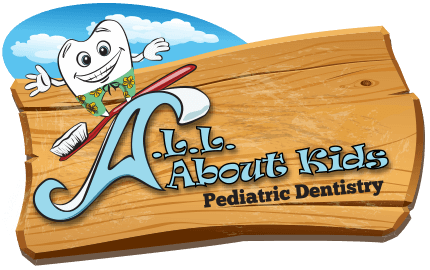FAQs
A.L.L. About Kids Pediatric Dentistry
Have a pediatric dentistry-related question? We have the answer. Check out these FAQs and give us a call today for more information!
What is the difference between a pediatric and general dentist?
Dr. Lewis is a certified pediatric dental specialist. In order to hold this title, she completed extensive training, including receiving a degree in dentistry prior to completing a two-year residency program to earn a specialty certification. As a pediatric dental office, her practice is limited to the treatment of patients from age 0-18, including patients with special needs.
When should I schedule the first visit?
In our experience, as well as per industry standard, it is recommended children see the dentist by their first birthday. Contact us if you have questions about scheduling appointments for your children with a kids dentist like A.L.L. About Kids Pediatric Dentistry!
How often will my child need check-ups?
In our experience, Children should be seen every six months unless they have dental concerns that require more frequent visits. As a children's dentist, A.L.L. About Kids Pediatric Dentistry will protect your child's smile with regular visits.
Does my child's diet affect their dental health?
A balanced diet is crucial for the proper development of your child's teeth, as well as the health of the surrounding tissues. A healthy diet includes dairy, protein, fruit, vegetables, and whole grains. It is important to avoid frequent use of starchy, sticky, or sugary foods, as well as sugary beverages. In our experience, it is essential to combine a proper diet with quality care from a pediatric dentist for a healthy smile!
What can I do to prevent "baby bottle decay"?
Decay occurs when sugars or starches sit on the teeth and cause bacteria to wear away at the tooth's protective coating, called the enamel. The best way to prevent any decay is to limit sugary foods and drinks and to always brush after eating. Parents should avoid giving their child a bottle or sippy cup with milk at bedtime, as the sugars in the milk will then sit on their teeth. Sugared beverages, including juice, should be avoided altogether. Instead, use water for bottles or sippy cups given before bedtime. Consult your pediatric dentist for more advice on preventing "baby bottle decay"!
How can I prevent cavities?
In our experience, we recommend the following routines for dental health in children:
- Brush and floss twice daily
- Limit sugary drinks, especially between meals
- Get a dental check up and cleaning every six month by a professional dentist
- Avoid sticky foods
- Give "treat" foods with mealtime (rather than between meals)
- Choose nutritious snacks
Is dental care really needed? Won't the baby teeth be lost anyway?
Your child's teeth are important for many reasons. They are needed for the correct pronunciation of words and sounds. Baby teeth are needed for proper chewing so that your child gets proper nutrition.
Proper dental care helps your child to avoid the pain and infection associated with cavities. Finally, and perhaps most importantly, baby teeth lay the groundwork for the adult teeth that will eventually take their place. Without healthy baby teeth, the adult teeth may come in poorly aligned or decayed. It is essential to have your children visit a kids dentist to avoid issues later.
What treatments do you provide?
As a pediatric dental office, we offer comprehensive pediatric dental services, including cleanings, nutritional counseling, sealants, fluoride/varnish treatments, composite fillings, nitrous oxide, crowns, and pulpotomy.
When should I start giving my child toothpaste?
Here is what we recommend for giving your child toothpaste: You should start brushing your child's teeth twice daily with children's toothpaste (no fluoride), before changing to fluoridated toothpaste once your child can spit properly. Prior to that, you should clean the gums with a soft cloth and water. Children less than two should get a dab of toothpaste with just enough to very thinly cover the bristles. After age two, you can advance to a "pea-sized" portion of paste. After brushing, have your child spit out the paste. Proper care will create consistent dental health for your child, which means visits to the dentist will go more smoothly. In our experience, a proper dental regimen combined with regular visits to the pediatric dentist will lead to better dental health for your child.
How do I know if my child is getting enough fluoride?
Most children get a sufficient amount of fluoride from water, foods, and toothpaste. As a pediatric dentist, Dr. Lewis can evaluate your child's fluoride needs at each six-month cleaning appointment.
